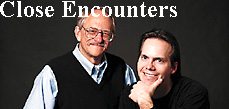

Quinn's devotion to his former student is just one example of the personal research relationships between professors and their students--graduate and undergraduate--at the UW. While the academic stereotype portrays high-paid, aloof professors treating their research students as go-fers who get little recognition, more often faculty and students work together and learn from each other during their course of discovery.
Sometimes it is a disaster that illuminates these relationships. Last March, Zoology Professor Joel Kingsolver and his students were stunned when a fire completely destroyed their fifth-floor lab in Kincaid Hall. The blaze consumed an invaluable butterfly collection, a lab full of equipment, and data and chemicals belonging to his graduate students.
Kingsolver, a renowned authority in his field, not only had to deal with the loss of his priceless collection but the disruption of his students' works and lives. "The lab looked like a bomb had exploded in there," Kingsolver recalls. "It was devastating because it brought things to a dead stop."
There was some good news--the fire only wiped out his lab, not his office or other facilities where some data was stored. And he and his students had saved copies of their research work elsewhere on campus. Still, his three grad students lost valuable information, had no place to work, and were quite shaken. The department was quick to come to everyone's aid, offering emergency lab space so his students could go on with their work. But Art Woods, a fifth-year Ph.D. student on the cusp of finishing his thesis, was forced to delay completion for a few months.
Replacing the lab, equipment and collections would come in time. But what about everyone's psyches? Kingsolver made sure to have lunch with his students every day following the fire. "I'm not one who is buddy-buddy with his students," he says. "But we had to learn to deal with this and what it meant. We talked about what a shock it was, how people felt about it."
Kingsolver also had students over to his Ravenna home for dinner and more heart-to-heart talks. "There were a lot of hugs and tears," he says. "In a way, it pulled us together."
A year later, the lab is rebuilt, and life has pretty much returned to normal. "The support Joel gave us meant a lot," says Woods, who will be leaving for a postdoctoral assignment at Arizona State University. "We had a lot of fears that we would be blamed for disrupting much of the department's research. But it wasn't the case at all. The support we got from Joel and the other professors made the difference."
President Calls for More Undergraduates Involved in
Research
Undergrad Designs New Instrument to
Measure Hot Springs on Ocean Floor
Partially
Sighted Student Is Valued Member of Botany Research Team
Send a letter to the editor at columns@u.washington.edu.